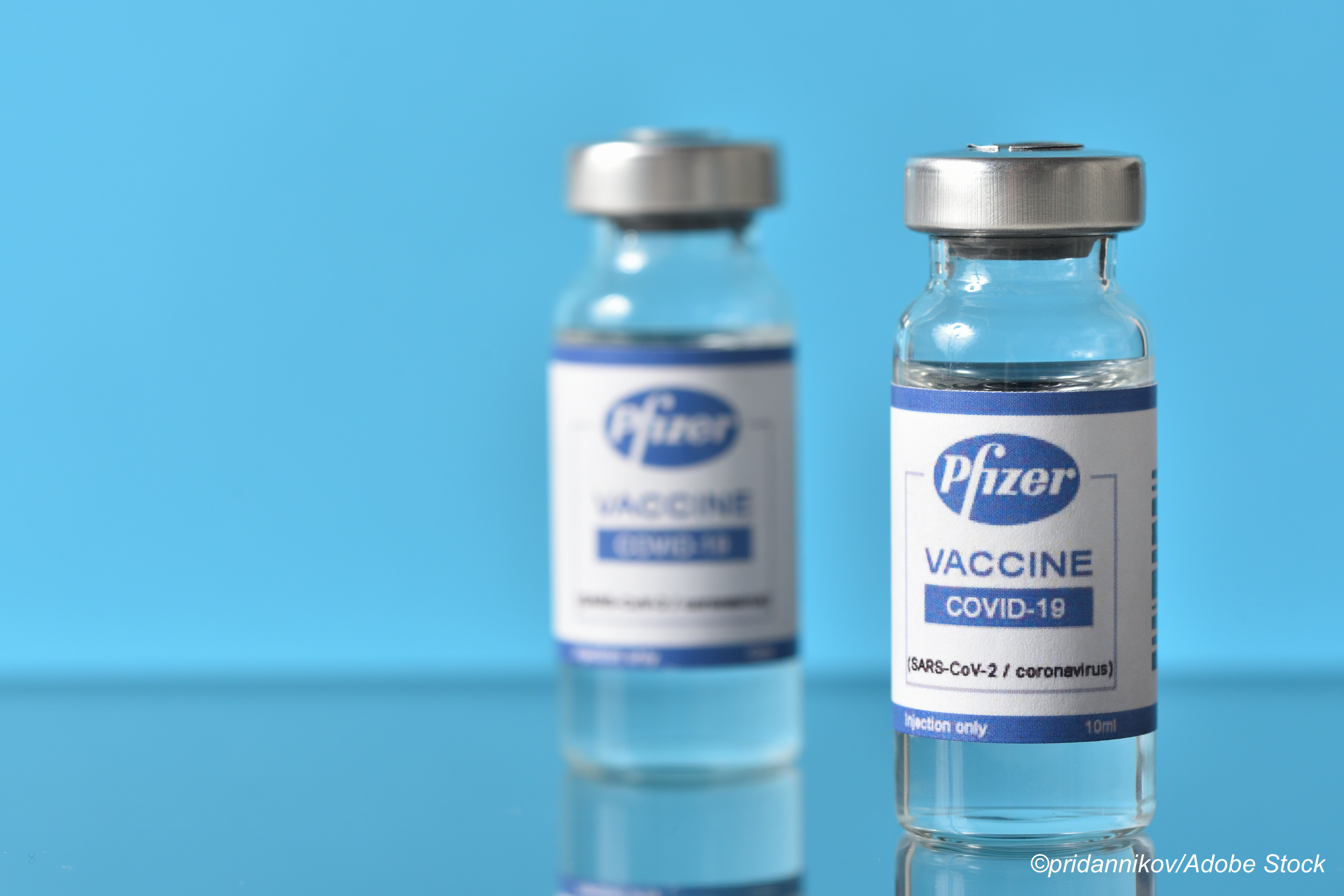
Protection against Covid-19 hospitalization 6 months after full vaccination held steady at around 90% for the BNT162b2 vaccine, but the vaccine’s effectiveness against infection declined significantly in a real-world use analysis involving 3.4 million people.
Overall protection from infection declined over time, from 88% (95% CI, 86–89) during the first month after full vaccination to 47% (95% CI, 43–51) in the fifth month.
Efficacy against infection with the SARS-CoV-2 Delta variant, which reached 90% in the month following full vaccination, declined to 53% after 4 months.
Findings from the retrospective analysis of vaccination data involving members of the Kaiser Permanente Southern California (KPSC) health system “suggest that booster doses might eventually be needed to restore the high levels of protection observed early in the vaccination program,” wrote KPSC researcher Sara Tartof, PhD, and colleagues.
The study, published online Monday, Oct. 4 in The Lancet, was funded by Pfizer and several researchers were employees of the company.
The peer-reviewed publication comes as federal health officials debate the need for Covid-19 vaccine booster doses.
On Tuesday, Johnson & Johnson announced that it is seeking emergency use authorization (EUA) from the FDA for a booster dose of its single-shot vaccine, following the lead of Pfizer and Moderna.
The FDA’s vaccine advisory committee is scheduled to meet Oct. 14 and 15 to hear data and make booster recommendations for the Moderna and J&J vaccines. The committee has already weighed in on the BNT162b2 vaccine, recommending boosters for people over age 65 years, health care workers, and others at high risk for Covid-19 complications.
The newly published real-world use study was conducted to address concerns that the emerging dominance of the SARS-CoV-2 Delta variant could impact the BNT162b2 vaccine’s effectiveness, as well as concerns about waning immunity over time, Tartof and colleagues wrote.
“Our variant-specific analysis suggests that reductions in (the vaccine’s) effectiveness over time are likely to be primarily due to waning vaccine protection given that effectiveness against Delta variant infections was more than 90% within 1 month of full vaccinations, reductions in effectiveness in infections by time since being fully vaccinated were observed irrespective of SARS-CoV-2 variant, and effectiveness against hospital admissions due to the Delta variant was very high over the entire study period,” they wrote.
The study included data from mid-December 2020 through early August 2021 and involved 3,436,957 KPSC health plan members age 12 years and older (median age, 45 years; 52% were female).
Among those who were fully vaccinated with the BNT162b2 vaccine, overall effectiveness was 73% (95% CI 72-74) against SARS-CoV-2 infections and 90% (89-92) against Covid-19-related hospital admissions.
Among sequenced infections, vaccine effectiveness against Delta variant infections was high during the first month after full vaccination (93%; 95% CI, 85–97) but declined to 53% (95% CI, 39–65) after 4 months.
Among the other major findings:
- After full vaccination, the vaccine’s efficacy for non-Delta variants at the one month mark was 97% (95% CI, 95-99), but waned to 67% (95% CI, 45-80) at 4 and 5 months.
- For the Delta variant, efficacy was high overall for all ages—93%; 95% CI, 84-96 for up to 6 months.
- No difference in waning immunity was identified between variant types, but the researchers noted that the number of events at 3 and 4 months was low for variant analyses.
“As such, analyses with longer follow-up to measure the rate of waning for the Delta versus other variants are warranted,” they wrote.
Tartof and colleagues noted that the finding of significant waning efficacy over time against infection, but not Covid-19 hospitalization, is consistent with previously reported preliminary data from Israel and the U.S. Centers for Disease Control and Prevention.
“The most recent report from August 2021 from Israel, however, suggests that some reduction in effectiveness against hospital admissions has been observed among older people (≥65 years) roughly 6 months after receiving the second dose of BNT162b2,” they noted.
“Our findings underscore the importance of monitoring vaccine effectiveness over time and suggest that booster doses might eventually be needed to restore the high levels of protection observed early in the vaccination program,” they concluded. “These factors are especially important to help control heightened transmission of the Delta variant as we enter the upcoming autumn and winter viral respiratory season.”
Limitations of the study include its observational design and thus the inability to establish causal relationships between the vaccine and Covid-19 outcomes.
-
Protection against Covid-19 hospitalization 6 months after full vaccination held steady at around 90% for the BNT162b2 vaccine, but the vaccine’s effectiveness against infection declined significantly in a real-world use analysis.
-
Efficacy against infection with the SARS-CoV-2 Delta variant, which reached 90% in the month following full vaccination, declined to 53% after 4 months.
Salynn Boyles, Contributing Writer, BreakingMED™
This research was funded by Pfizer. Jeff Slezak and several other researchers are employees and hold stock and stock options in Pfizer.
Cat ID: 31
Topic ID: 79,31,730,933,31,926,561,927,151,928,925,934


